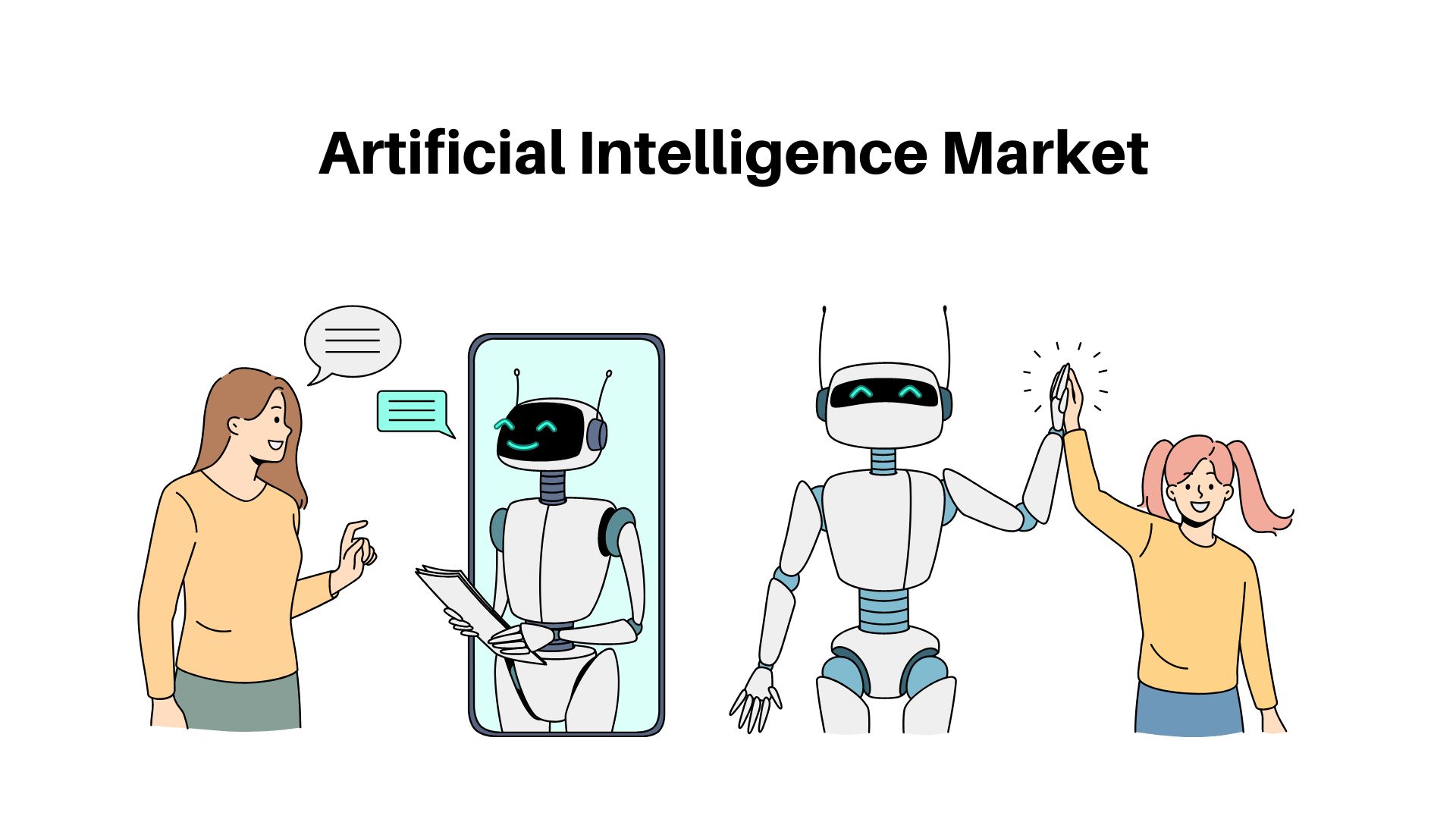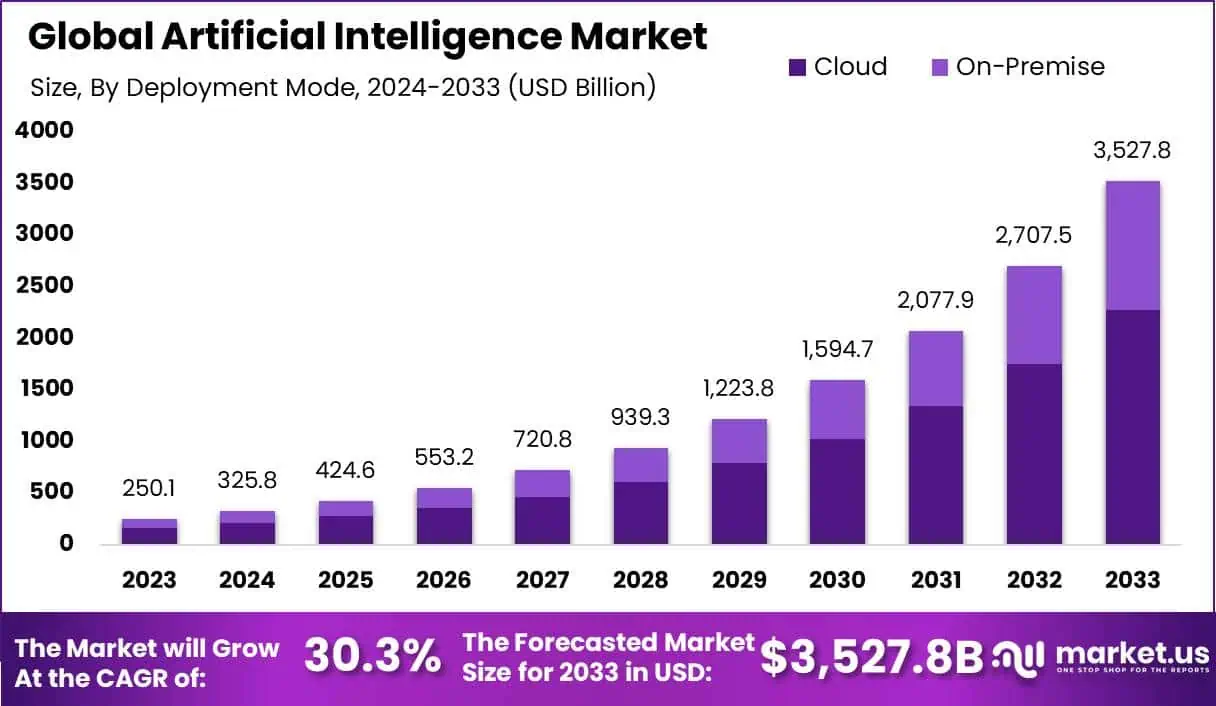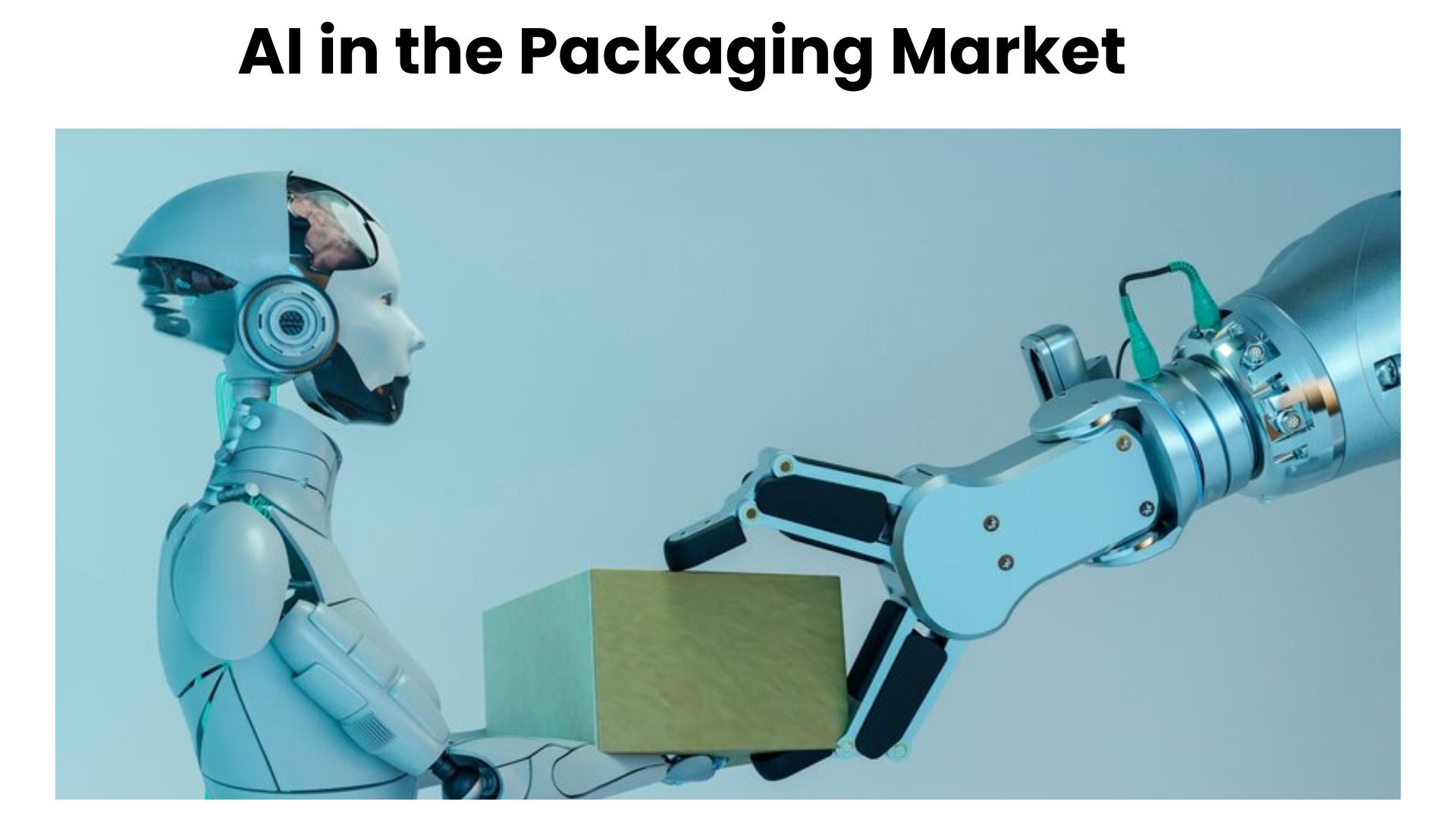Explosive Growth in AI: Artificial Intelligence Market To Hit USD 2,745 Billion by 2033

Page Contents
Artificial Intelligence Market Size and Forecast
Published Via 11Press: The Artificial Intelligence (AI) market has demonstrated an exceptional trajectory of growth, with its valuation escalating from US$ 177 billion in 2023 to an anticipated US$ 2,745 billion by 2032. This remarkable expansion, characterized by a Compound Annual Growth Rate (CAGR) of 36.8% over the forecast period from 2023 to 2032, underscores the burgeoning adoption and integration of AI technologies across various sectors.
The substantial increase in market value can be attributed to the widespread recognition of AI's potential to revolutionize industries by enhancing efficiency, automating processes, and fostering innovation. This growth trajectory not only highlights the pivotal role of AI in driving technological advancement but also signals significant investment opportunities within the AI sector. Stakeholders are advised to closely monitor developments within this market, as the rapid evolution of AI capabilities is likely to unlock new avenues for application and drive further market expansion.
Key Takeaways
- The Artificial Intelligence market is projected to reach USD 2,745 billion by 2033, with a steady Compound Annual Growth Rate (CAGR) of 36.8%.
- In 2022, the software segment held the largest market share at over 39.3%, indicating its crucial role in AI systems.
- Deep learning, a subset of machine learning, accounted for more than 35.0% of the AI market share in 2022, showcasing its importance in handling complex datasets.
- The Advertising & Media segment dominated the market in 2022, contributing to over 21% of the AI market share, driven by personalized marketing strategies enabled by AI.
- North America led the AI market, capturing over 51.1% of the global market share in 2022, driven by its advanced technological infrastructure and high adoption rates across key sectors.
- In 2022, the software segment's dominance was primarily due to its integral role in driving AI technologies' functionality and advancement.
- The growth of the deep learning segment was fueled by its advanced capabilities in handling large and complex datasets, crucial for applications like image recognition and speech processing.
- The dominance of the Advertising & Media segment was attributed to AI's transformative impact on content creation, optimization, and delivery to target audiences.
- One of the key drivers of the AI market is the increasing adoption of autonomous AI systems, which automate tasks and make decisions without human intervention.
- Challenges in the AI market include issues related to data availability and quality, which impact the effectiveness and reliability of AI systems.
- The rapid growth in digital data presents a significant opportunity for the AI market, enabling organizations to extract insights and create value through advanced analytics and machine learning.

Identify key segments and regions in the market. Request For Sample Report Before Buying @ https://market.us/report/artificial-intelligence-market/request-sample/
Users Statistics
- Business Adoption and Investment: Approximately 35% of companies globally have integrated AI into their operations. A notable 91% of leading businesses are actively investing in AI, with a significant portion also increasing their investments to leverage AI's potential in improving productivity and operational efficiency.
- Industry-Specific AI Usage: AI spending in the retail sector is projected to reach $20.05 billion by 2026, highlighting the technology's critical role in personalization and customer service. Similarly, the healthcare and financial services sectors show substantial AI adoption, aiming to enhance patient care and streamline financial operations.
- Productivity and Employment: AI technologies are credited with boosting employee productivity in 61% of workplaces. Despite fears of job displacement, AI is expected to create 12 million more jobs than it replaces by 2025, underscoring its role in generating new employment opportunities across industries.
- Consumer Engagement and Services: A vast majority (97%) of mobile users engage with AI-powered voice assistants, and the global chatbot market is anticipated to reach $1.25 billion by 2025. These statistics reflect the growing consumer comfort and reliance on AI for daily tasks and information access.
- Adoption Rates and Future Projections: The marketing and advertising industries lead in AI adoption with a rate of 37%, followed closely by the technology and consulting sectors. The anticipated increase in AI-powered voice assistants, expected to reach 8 billion units by 2023, indicates a significant trend toward voice-enabled services.
Drivers
- Technological Advancements: Innovations in machine learning, deep learning, and neural networks are propelling the AI market forward. These technologies are enhancing the capabilities of AI systems, making them more efficient and effective at processing and analyzing large datasets.
- Big Data Expansion: The exponential growth of data, fueled by the digitalization of industries and the Internet of Things (IoT), necessitates advanced AI for effective data processing, analysis, and interpretation. AI's ability to handle vast amounts of unstructured data is crucial for extracting valuable insights and making informed decisions.
- Increased Demand for Automation: Businesses are seeking to improve efficiency and reduce operational costs through automation. AI-driven automation solutions are being widely adopted for routine tasks, enhancing productivity and enabling employees to focus on more strategic activities.
- Cloud Computing Growth: The surge in cloud computing adoption provides the necessary infrastructure for AI development and deployment. Cloud platforms offer scalable resources for training and running AI models, making AI more accessible to companies of all sizes.
- AI in Service Operations and Risk Management: AI is significantly impacting service operations and risk management by improving customer service and operational efficiencies. Industries such as finance, healthcare, and retail are leveraging AI for risk assessment, fraud detection, and customer experience enhancement.
- Regulatory Environment: The regulatory landscape is evolving to address the challenges and risks associated with AI, including privacy concerns, ethical considerations, and job displacement. Governments worldwide are developing frameworks to ensure the responsible use of AI technologies.
- Market Demand Concentration: A significant portion of AI demand is concentrated in specific industries, such as IT & telecom, healthcare, and BFSI (Banking, Financial Services, and Insurance). This concentration creates opportunities for companies specializing in AI solutions tailored to these sectors.
- Generative AI and Edge AI: The advancement of Generative AI and Edge AI technologies is opening up new possibilities for content creation and real-time processing at the network's edge, respectively. These technologies are expected to drive further innovation and adoption of AI across various applications.
Benefits of AI
- Solving Complex Problems: AI's advancements in machine and deep learning have enabled it to tackle complex challenges, such as fraud detection and personalized customer interactions, often without human intervention.
- Improving Education: AI can personalize learning experiences by adapting to individual learning styles and pacing, promising quality education globally.
- Bringing About Automation: Automation, one of AI's most significant advantages, increases productivity and efficiency across industries by performing repetitive tasks quickly and safely, thus reducing human error and improving product quality.
- Assisting in Smarter and Faster Decisions: AI aids in making informed decisions by analyzing data, identifying trends, and quantifying uncertainties without the influence of human emotions or biases.
- Minimizing Errors: By automating data entry and processing tasks, AI significantly reduces the chances of human errors, making systems more efficient.
- Enhancing Research and Data Analysis: AI's capability in data analysis and pattern recognition is particularly beneficial in scientific research, aiding in groundbreaking discoveries and treatments.
- Improving Customer Experience: Advanced AI chatbots can resolve customer queries efficiently, enhancing customer service and enabling businesses to operate with fewer customer service representatives.
- Advancing Medical Fields: AI contributes significantly to medicine, from patient monitoring technologies that allow remote care to deep learning algorithms that assist in early cancer diagnosis.
- Supporting the Criminal Justice System: In law enforcement, AI can analyze data to detect patterns and predict criminal behaviors, although its unbiased application is crucial
- Preserving the Environment: AI, combined with robotics, can improve recycling systems and manage renewable energy sources more efficiently, contributing to environmental conservation.
- Saving Lives: AI can predict natural disasters with greater accuracy, enabling early warnings and potentially saving lives by facilitating timely evacuations.
However, the adoption of AI in the workplace is still in its early stages, with only 10% of American employees using AI daily. Yet, 67% of business leaders are exploring its implementation, particularly in generative AI for content creation. The benefits in the workplace include enhanced business efficiency, smarter business decisions, improved customer service, and decreased operational costs. Nonetheless, potential risks such as discriminatory practices and job security concerns must be addressed to fully leverage AI's benefits
Challenges
- Complex Algorithms and Models: The intricate nature of AI algorithms and models poses significant understanding and development challenges. This complexity can hinder the creation of reliable and accurate systems.
- Privacy and Data Protection: AI's reliance on vast datasets raises critical concerns regarding privacy and data security. Ensuring the protection of personal and sensitive information is paramount for maintaining user trust.
- Computational Resources: The high computational demands of AI applications necessitate substantial processing power, which can lead to increased infrastructure costs. Scalable and cost-effective solutions, such as cloud computing, are essential for addressing this challenge.
- Data Availability: The performance of AI systems heavily depends on the availability of large and diverse datasets. The lack of such data in certain industries can limit AI's effectiveness and accuracy.
- Trust and Skepticism: The increasing sophistication of AI models, especially deep learning and language models, has led to a trust deficit among users. Ensuring transparency and explainability in AI systems is crucial for building confidence in these technologies.
- Ethical Concerns and Bias: Ethical considerations, particularly related to privacy, responsibility, and bias, are at the forefront of AI development challenges. Addressing algorithmic bias and promoting ethical AI usage are vital for preventing discriminatory outcomes and ensuring fairness.
- Implementation Strategies: Tailoring AI implementation to a company's specific needs and integrating AI into existing systems without clear objectives can be challenging. Developing effective strategies and roadmaps is essential for successful AI integration.
- Legal and Regulatory Issues: Navigating the legal implications of AI, including data protection laws, intellectual property rights, and liability, requires careful consideration and compliance with regulatory frameworks.
Opportunities
- Industry Disruption and Value Creation: AI is anticipated to significantly disrupt industries, particularly those reliant on knowledge work such as technology, financial services, pharmaceuticals, and education. Technology companies might see value addition equivalent to as much as 9% of global industry revenue, with knowledge-based industries like banking and pharmaceuticals also poised for substantial impacts. This shift is largely attributed to generative AI’s strengths in language-based activities rather than those requiring physical labor.
- Advancements in Large Language Models (LLMs): The scale and capabilities of LLMs, such as GPT-3 and PaLM, have expanded dramatically, showcasing AI's growing proficiency and its potential for complex problem-solving and innovation across fields.
- Environmental Considerations: Despite the high environmental costs associated with training large AI models, there is an ongoing effort to understand and mitigate the carbon footprint of AI developments, aligning with broader goals of sustainability and responsible AI use.
- Ethics and Diversity in AI: The increase in ethics-related research and diversity within the AI field highlights the community's commitment to addressing ethical challenges and promoting inclusivity. This trend is vital for ensuring that AI technologies are developed and applied in ways that are fair, accountable, and transparent.
- Workforce Transformation: AI is expected to reshape job roles and functions, particularly in service operations where a reduction in workforce size might occur due to automation. However, there is a strong emphasis on reskilling and adapting the workforce to leverage AI’s potential fully, indicating a shift towards more AI-integrated roles and responsibilities.
- Legislative and Policy Development: The growing number of AI-related legislations globally reflects the increasing recognition of AI's impact and the need for frameworks that guide its ethical and responsible use. These laws and policies are crucial for addressing AI's challenges while harnessing its opportunities.
- Investment and Corporate Engagement: Despite fluctuations, corporate investment in AI remains robust, underscoring the business community's strong belief in AI's transformative potential. The continuous investment is a testament to AI’s role as a key driver of innovation and competitive advantage.
Recent Developments
- Generative AI's Advancement: Generative AI has been making strides, significantly impacting content creation processes. AMD’s Instinct MI300X accelerator, designed around generative AI processes, exemplifies the technological advancements in this area, highlighting AI's capability to generate unique images, videos, and audio from existing data.
- Edge AI's Rising Popularity: The Edge AI market is expected to thrive, driven by advancements in AI, 5G connectivity, and the Internet of Things (IoT). This technology facilitates real-time processing capabilities at network endpoints, enhancing efficiency and reducing latency.
- Explainable AI's Importance: The focus on making AI systems transparent and easy to understand has been increasing, with the global Explainable AI market valued at ~5012 million USD and expected to grow at a CAGR of 16.5% between 2023-2029. This trend underscores the need to address AI's “black box” effect, ensuring users can understand and trust AI decisions.
- AI in Manufacturing: AI is revolutionizing the manufacturing sector, particularly in predictive maintenance and machinery inspection. The AI in the manufacturing market is expected to grow significantly, with a projected market size of USD ~21 billion by 2028. This growth is driven by AI's ability to predict equipment failures, enhance productivity, and reduce downtime.
Strategic Collaborations and Investments:
- Microsoft and Siemens have collaborated to introduce the Siemens Industrial Copilot, an AI assistant aimed at enhancing human-machine collaboration in the manufacturing sector.
- NVIDIA Corporation announced NVIDIA OVX Servers featuring the new NVIDIA® L40S GPU to accelerate AI training and inference, among other applications.
- Intel Corporation launched 4th Gen Xeon Scalable Processors and Max Series CPUs and GPUs, focusing on sustainable data center processors for AI frameworks.
Key Players Analysis
Advanced Micro Devices (AMD)
AMD is gaining momentum in the AI space with its high-performance computing and graphics technologies. The company's GPUs and CPUs are instrumental in AI and machine learning applications, providing the necessary computational power for complex data processing and analysis.
AiCure
AiCure leverages AI to transform patient behavior analysis in clinical trials and patient care. Their platform uses advanced data analytics to improve medication adherence and patient engagement, showcasing the potential of AI in healthcare.
International Business Machines Corporation (IBM)
IBM is a pioneer in AI, known for its Watson platform. Watson offers a wide range of AI services and applications, from healthcare to financial services, demonstrating IBM's commitment to leveraging AI for solving complex business and societal challenges.
Oracle Corporation
Oracle integrates AI across its cloud services and software offerings, enhancing business operations and decision-making processes. Its AI-powered solutions help in automating tasks, gaining insights from data, and improving customer experiences.
Amazon Web Services (AWS)
AWS offers a comprehensive set of AI and machine learning services, making it easier for developers to build sophisticated AI applications. AWS's AI services cover a wide range of applications, including language processing, image and video analysis, and machine learning technologies.
Cisco Systems Inc.
Cisco incorporates AI into its networking and security solutions, optimizing operations, and enhancing threat detection. Its AI-driven networking solutions aim to provide more intelligent, automated management of network resources.
Arm Limited
Arm's technologies power mobile computing and IoT devices, where AI is increasingly important. Arm designs scalable, energy-efficient processors that enable AI capabilities in billions of devices, from smartphones to sensors.
Atomwise, Inc.
Atomwise uses AI for drug discovery, utilizing deep learning to shorten the time and reduce the costs associated with developing new medicines. Their AI platform identifies potential drug candidates by analyzing molecular structures.
Ayasdi AI LLC
Ayasdi offers an AI platform that enables organizations to extract insights from complex data. Its machine intelligence software is used in healthcare, financial services, and government sectors to solve critical problems.
Baidu, Inc.
Baidu is a leader in China's AI industry, developing AI technologies that power its search engine, autonomous driving projects, and cloud services. Its deep learning platform, PaddlePaddle, supports a wide range of AI applications.
Clarifai, Inc
Clarifai specializes in computer vision and uses AI to understand images and videos. Its platform is used in various applications, including security, marketing, and user experience enhancement.
HyperVerge, Inc.
HyperVerge leverages AI for identity verification and fraud detection solutions. Its technology is used in financial services, telecom, and government sectors for real-time verification processes.
Intel Corporation
Intel provides hardware and software solutions that power AI applications. Its processors and AI accelerators are designed to handle large volumes of data and complex computations required for AI workloads.
Microsoft Corporation
Microsoft's AI efforts are integrated across its products and services, from Azure AI, a cloud computing service, to its cognitive services and business applications. Microsoft emphasizes ethical AI development and democratizing AI technology access.
Google is at the forefront of AI research and applications, with innovations in machine learning, natural language processing, and quantum computing. Its AI-first approach is evident in its products and services, including Google Assistant and TensorFlow.
NVIDIA Corporation
NVIDIA is a key player in AI due to its GPU technology, which is crucial for deep learning and AI computations. NVIDIA's platforms and tools are widely used in AI research, autonomous vehicles, and data centers.
Other Key Players
The AI market is also enriched by numerous startups and emerging companies focusing on specific AI niches, from healthcare diagnostics to AI-powered cybersecurity solutions. These companies contribute to the vibrant ecosystem of AI innovation and application.
Conclusion
The Artificial Intelligence (AI) market is undergoing rapid transformation, marked by significant technological advancements, strategic collaborations, and a wide range of applications across various industries. From healthcare and automotive to IT & Telecom and manufacturing, AI's influence is pervasive, driving efficiencies, innovation, and new opportunities for growth. Key players like Google, Microsoft, IBM, NVIDIA, and Amazon Web Services are at the forefront of this evolution, continuously pushing the boundaries of what's possible with AI and machine learning technologies.
North America leads the AI market, thanks to its robust ecosystem of tech giants, startups, and academic institutions, fostering innovation and research. Meanwhile, the Asia Pacific region is witnessing the fastest growth, propelled by aggressive investments and government support, particularly in China. Europe's focus on ethical AI and regulatory frameworks exemplifies a balanced approach to harnessing AI's potential while addressing privacy and ethical concerns.
The future of the AI market looks promising, with cloud and on-premises deployments enabling businesses to leverage AI capabilities more effectively. However, challenges such as algorithmic bias, privacy issues, and the need for skilled personnel remain. Addressing these challenges through regulatory measures, ethical AI development, and education will be crucial for sustainable growth.
As AI continues to evolve, it will undoubtedly play a central role in shaping the future of business and society. The ongoing investments, research, and collaborative efforts among key market players indicate a commitment to not only advancing AI technology but also ensuring its responsible and beneficial use. The AI market is poised for exponential growth, promising to unveil new levels of innovation and efficiency across the global economy.
The team behind market.us, marketresearch.biz, market.biz and more. Our purpose is to keep our customers ahead of the game with regard to the markets. They may fluctuate up or down, but we will help you to stay ahead of the curve in these market fluctuations. Our consistent growth and ability to deliver in-depth analyses and market insight has engaged genuine market players. They have faith in us to offer the data and information they require to make balanced and decisive marketing decisions.



